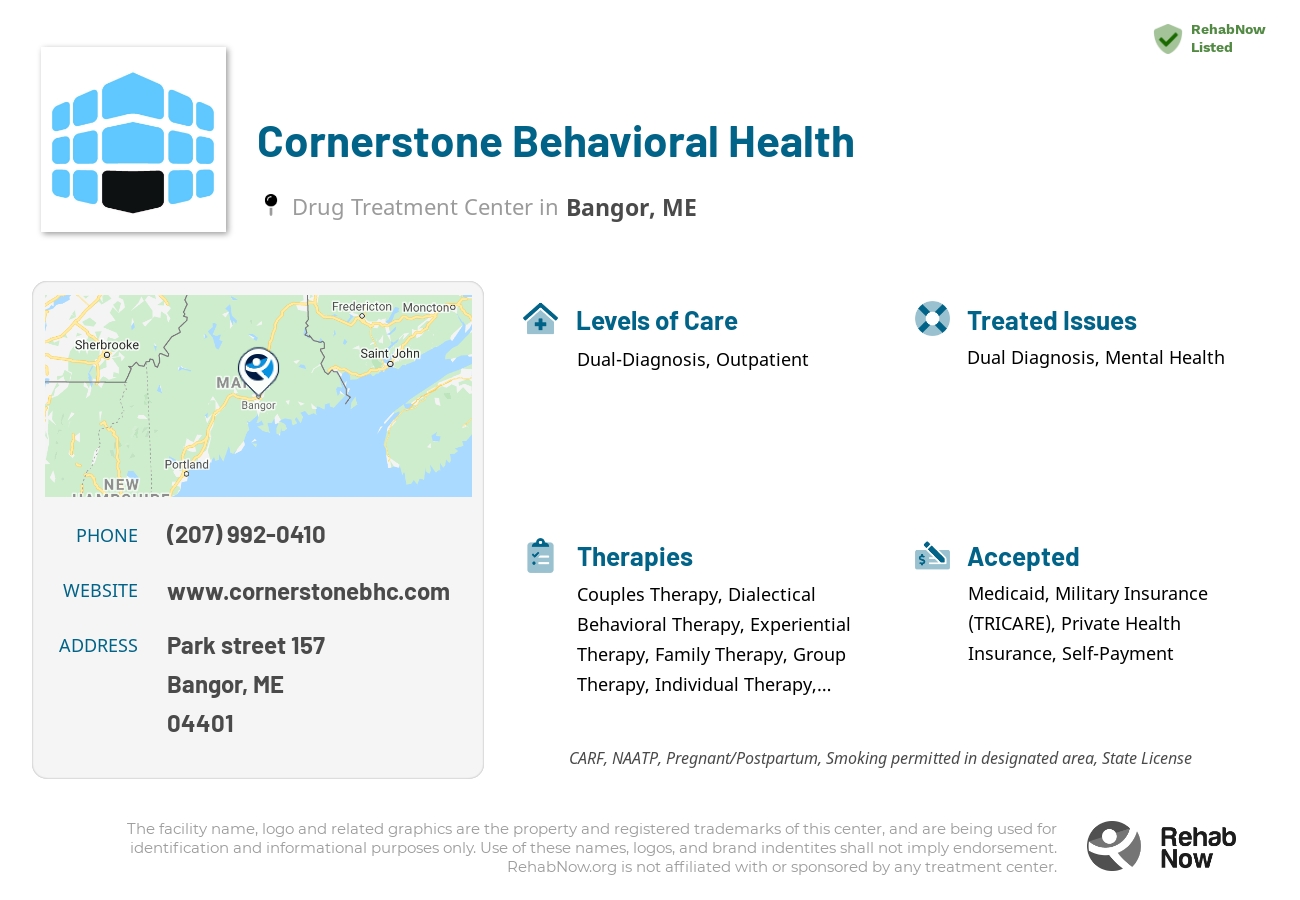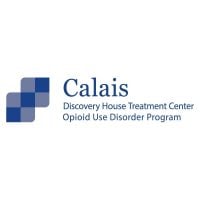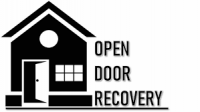Cornerstone Behavioral Health
Drug Rehab Center in Bangor, Maine
Cornerstone Behavioral Health in Bangor, Maine is a private facility that provides comprehensive mental health and substance use disorder treatment services, including residential, outpatient, and sober living programs, as well as family support services, trauma treatment, and psychiatric assessment and medication management.
About Cornerstone Behavioral Health in Maine
Founded in 2008, Cornerstone Behavioral Health is an Addiction Treatment Facility located in Bangor, Maine. This facility specializes in providing treatment for individuals who are suffering from Dual Diagnosis, Mental Health issues, Drug Addiction, Substance Abuse, and Alcoholism. They offer a range of levels of care including Dual-Diagnosis programs, Outpatient services, and Detoxification options. Cornerstone Behavioral Health is committed to providing professional support and treatment by addressing the complex needs of each individual in a compassionate and understanding manner.
Cornerstone Behavioral Health offers a variety of services and treatment methods to help individuals struggling with addiction and substance abuse. Their dual-diagnosis programs focus on addressing both drug addiction and underlying mental health conditions simultaneously. The facility also provides outpatient services for those who need ongoing support while maintaining their daily routines and responsibilities. In addition, they offer detoxification programs to help individuals safely cleanse their bodies from harmful substances. Cornerstone Behavioral Health embraces a comprehensive approach to treatment that includes therapy sessions, counseling, behavioral interventions, psychoeducation classes, relapse prevention techniques, family involvement opportunities, and aftercare planning to ensure long-term success in recovery.
Genders
Ages
Modality
Additional
Conditions and Issues Treated
A drug rehab center that uses Dual Diagnosis is more likely to be successful in rehabilitating a person. Dual diagnosis helps to identify and treat any co-occurring disorders. It is essential to screen for both addiction and any untreated mental health issues. A dual diagnosis gives rehab the means to treat addiction while restoring mental and emotional health.
About 70% of patients with drug addiction have at least one other psychiatric diagnosis. Fortunately, dual diagnosis treatment is a proven model that has been highly effective.
Levels of Care Offered
This center offers a variety of custom treatment tailored to individual recovery. Currently available are Dual-Diagnosis, Outpatient, with additional therapies available as listed below.
Outpatient programs offer a lower intensity level of addiction treatment than inpatient facilities. They are ideal for those who have graduated from inpatient facilities, have a supportive home environment, and are motivated to commit to the program. Services offered include medication-assisted treatment, individual and group therapy, and peer group support.
This treatment is a popular option for those suffering from a lower intensity addiction. It is not advisable for someone who needs to go through a medically supervised detox or does not have a supportive home environment. It requires motivation and dedication to commit to the program without constant monitoring.
Therapies & Programs
During individual therapy at Cornerstone Behavioral Health in , the person in recovery meets with a therapist one on one to go over their situation and learn from past mistakes. The counselor or therapist will use this time to address the causes of addiction, triggers, and any mental issue or dual diagnosis. They will also address aftercare plans, giving them the best chances of long-term sobriety.
This therapeutic process is very intense and challenging to go through. Some clients may find it easier to open up with someone apart from their family or loved ones who understand their struggles and experience with addiction.
The process of going through couple’s therapy at Cornerstone Behavioral Health in allows for both partners to be on the same page regarding addiction recovery. Whether one or both members of the couple struggled with addiction, they can improve their odds of sobriety by undergoing this treatment together. This therapeutic environment teaches how to communicate effectively and avoid relapse triggers while building healthy lifestyles that may help maintain sobriety following graduation from rehab programs.
Family therapy is designed to help addicts get clean and sober by using what they love the most; their family. Most drug treatment centers make it mandatory that the addict’s family attend therapy sessions, which is great because having everyone there to support them makes it much easier for them to get clean. Not only are they surrounded by people who want them to get better, but everyone is there because they want the best for them, not because they feel like they have to be.
Drug addicts are often surrounded by resentful or uneducated family members who would, at times, rather see them stay addicted because it makes their own lives easier. Sometimes they don’t understand what the addiction is or how they play a part in it. They know that during and after the addict’s sobriety journey, they will face challenges and changes that they aren’t sure how to handle. This can be very tough for an addict to go through on their own, which is why it’s so important that they have the support of their family. Just because someone is an addict does not mean that they don’t deserve the love and support of those around them.
Addicts in Bangor, ME can find support in group therapy at Cornerstone Behavioral Health by finding peers who understand their situation and being held accountable. They also learn to develop faith, understanding, and insight into their addiction through shared conversations.
Group Therapy is employed by drug treatment centers to provide the recovering addict with a platform to talk about their feelings and experiences. It also provides for an opportunity to learn from other addicts who have successfully overcome their addiction. It is recommended that all group members be recovering addicts for this type of therapy to work.
Trauma therapy allows people who struggled with a past trauma to face the situation and learn from it. Many people go through traumatic events at an early age that later leads them into addiction as adults. By addressing this issue during treatment at Cornerstone Behavioral Health in [/type], you can move forward with your recovery process and take back control of your sober future, too!
Traumas are one of the most common causes of psychological disorders such as Addiction Disorder. It’s often found among those diagnosed with Addictive Disorders because traumatized individuals have strong emotions or thoughts related to their traumas, leading to addictive behaviors.
Dialectical behavior therapy (DBT) is a cognitive-behavioral therapy that focuses on eliminating specific negative thoughts, such as suicidal thoughts. These negative thoughts can potentially lead to an individual inflicting self-harm. It helps treat patients exhibiting uncontrollable emotions, intense mood swings, and borderline personality disorders.
The term “Dialectic” means the integration of opposites. In substance abuse, DBT refers to accepting the patient’s addiction and working to change their thoughts and behavior. It improves life skills such as controlling intense emotions without reacting impulsively, resolving interpersonal conflicts effectively, and promoting awareness about self and others.
Cognitive Behavioral Therapy (CBT) helps addicts comprehend the causes of their substance abuse and the consequences that follow. The treatment’s goal is to help addicts gain self-control and maintain abstinence from drugs and alcohol over the long term. Through CBT, clients learn to recognize and avoid high-risk situations and cope with challenging situations when they arise.
Patient Experience
Experiential Therapy at Cornerstone Behavioral Health
Experiential therapy is a type of treatment involving immediate, intense experiences designed to manage addiction. Experiential therapy is beneficial for:
- People who are seeking to overcome an addiction but have difficulty focusing on treatment goals
- People with short attention spans due to high levels of stress or difficulty concentrating
- People who are afraid of engaging in treatment due to negative past experiences
Payment Options Accepted
For specific insurance or payment methods please contact us.
Is your insurance accepted?
Ask an expert, call (888) 674-0062
Additional Details
Specifics, location, and helpful extra information.
Bangor, Maine 4401 Phone Number(207) 992-0410 Meta DetailsUpdated November 25, 2023
Staff Verified
Cornerstone Behavioral Health Patient Reviews
There are no reviews yet. Be the first one to write one.
Bangor, Maine Addiction Information
Prescription opioid abuse is the most common form of substance abuse in Maine. More than 10% of these residents have also admitted to using prescription drugs for non-medical purposes. Between 2013 and 2014, 4 out of every 5 deaths in Maine were caused by illicit drugs. One in five high school students in Maine uses marijuana every single month.
Bangor, ME, has a moderate drug addiction problem, according to the most recent National Survey on Drug Use and Health (NSDUH). In 2018, there were 354 drug fatalities in Maine, compared with 417 in 2017. There are twice as many drug-related emergency room visits in Bangor, ME as the national average. Inpatient rehab in Bangor includes a variety of programs such as extended care and transitional housing.
Treatment in Nearby Cities
- West Buxton, ME (120.2 mi.)
- Brunswick, ME (85.4 mi.)
- Dover-Foxcroft, ME (34.4 mi.)
- Gorham, ME (113.8 mi.)
- Saco, ME (122.6 mi.)
Centers near Cornerstone Behavioral Health
The facility name, logo and brand are the property and registered trademarks of Cornerstone Behavioral Health, and are being used for identification and informational purposes only. Use of these names, logos and brands shall not imply endorsement. RehabNow.org is not affiliated with or sponsored by Cornerstone Behavioral Health.









